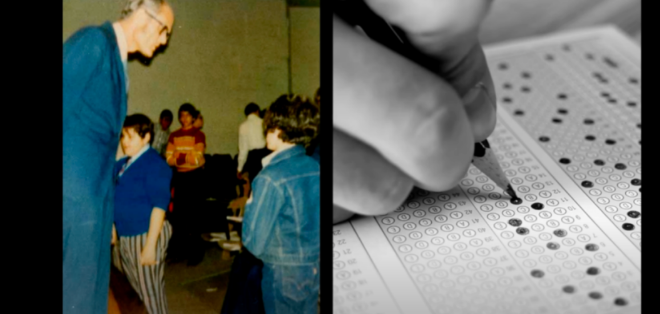Parents are often jealous and admire children with high IQs and outstanding talents. However, in reality, many genius children have high IQs but are quite eccentric, withdrawn and somewhat isolated. Many children suffer great trauma while growing up.
Scientists from Johns Hopkins University and Vanderbilt University in the United States tracked the growth trajectories of 5,000 gifted children over a period of 45 years. Ultimately, their investigation found that it turned people's perceptions upside down!
What is the definition of "genius"?
Joseph Bates, a 12-year-old student, complained every day that middle school classes were boring. His math scores were far above those of his classmates, so his parents had no choice but to send him to Johns Hopkins University to take computer science courses.
But he still surpassed other college students in his college studies. His teachers saw this and introduced him to Professor of Psychology Julian Stanley for testing and other IQ tests.

It was discovered that his SAT scores were far above the admission threshold for Johns Hopkins University. At the same time, his IQ was in the top 1% of children his age in the United States. So Professor Julian Stanley convinced the principal to let him become the youngest undergraduate student at the university.
At the same time, Joseph Bates also began preparing a study called the Study of Mathematically Precocious Youth (SMPY). SMPY defined “genius” as a child with outstanding mathematical ability. Through tests such as mathematical logic, it is estimated that gifted children have IQs in the top 1% of the nation.
"The Genius Research Project" shatters perceptions
The SMPY study was officially launched in 1971. Professor Julian Stanley and his students followed these 5,000 children. They observed their achievements at all levels of education from childhood to adulthood, their university entrance rate, their rate of obtaining master's and doctoral degrees, their rate of receiving scientific research patents, the number of articles published, their annual income after entering the workforce, etc.
Survey results show:
1. Geniuses with high IQs are more likely to succeed
The ancients believed that: Early maturity has the risk of premature aging. It is believed that developing children's talents and special abilities too early can cause harm in the future. However, the results of SMPY's research are the first to refute this opinion, the view that geniuses are more likely to succeed is scientifically based.
The study found that when these 5,000 high-IQ children grew up, they actually outperformed children with average IQs in every way.
Research from the Talent Identification Program at Duke University in the US also confirms this view. Teenagers who are among the top 10,000 in math or language scores before the age of 13 are essentially geniuses with IQs as high as 160.
37% of them received a PhD, 16.3% from a top university, 7.5% received tenure, and 39% published in peer-reviewed journals... Jonathan Wai, a psychologist at Duke University who led the survey, put it bluntly: Believe it or not, these IQ geniuses are actually controlling this society.
2. The key to IQ is spatial reasoning ability
We still understand simply: IQ refers to intelligence. But not only that, IQ also includes: Language ability, memory, logical analysis ability, spatial reasoning ability,... In which, spatial reasoning ability is considered the greatest untapped potential of humanity, playing a huge role in creativity and technological innovation.
SMPY researchers tested 563 gifted 13-year-olds who scored in the top 0.5 percentile of SAT scores on spatial awareness, the ability to understand and remember spatial relationships between objects. SMPY's findings showed that children with excellent spatial skills tend to become engineers, architects, and doctors, even if they don't have a particular advantage in math or language skills.
Research also suggests that spatial ability may be a more accurate predictor of future achievement in adolescents than other abilities.

3. Genius needs to be cultivated first
Many teachers and parents believe that early schooling, skipping grades, and skipping grades are not good for children. In fact, such views and practices will surely make gifted children become mediocre.
SMPY's research results show that if a child has a super high IQ but the family and school still use a fair and unifiededucational method to educate all children, it will hinder the development of the highly intelligent child.
Professor Julian Stanley, who led the study, believes that children with high IQs will have to skip grades and grades. For children with outstanding intelligence, parents and teachers need to give them more difficult challenges.
4. Children with high IQs have many
In the United States, many parents believe that becoming a doctor or scientist is the best path for children with high IQs. While the medical and scientific fields require significant intellectual ability, they are not the only career paths.
Genius can manifest itself in different ways and can develop differently in the future. In the SMPY study, many students chose to study medicine, while others chose fields such as economics and engineering. Some students with a talent for logic or language chose to become excellent lawyers and writers.
So, researchers believe: There are all kinds of ways to show intellectual talent. For parents of children with high IQs, it is more important to understand what areas their children are interested in, rather than just limiting their children to traditional fields of study.
5. Exploit strengths and avoid weaknesses
Many children are intelligent and clever when they are young, but when they grow up, they become mediocre people, not having a successful career as their parents expected. The cause of this problem comes from the parents' educational concept of forcing their children to study all subjects equally. In fact, such an approach will only weaken the child's talent, and can even make the child feel pressured and tired when studying subjects that they are not good at.
Most jobs in society do not require well-rounded talent but specialized talent.
This study breaks the long-standing traditional notion that: Children with high IQ can develop freely without intervention or help and can succeed thanks to their talents.
Every child should be raised as a genius.
Although SMPY focuses on the development of gifted children with high IQs, its implications for education are far-reaching and the ideas in this study can really be applied to all children.
Camilla Benbow, Dean of the School of Education and Human Development at Vanderbilt University, believes that every child should be treated as a genius regardless of ability. Perhaps this is the core message of the study.

Based on 45 years of observing the development of 5,000 gifted children, she and other researchers have come up with eight tips to encourage smart kids to achieve and be happy:
- Let children experience many different things.
- When your child shows strong interests or talents, create opportunities for them to develop.
- Not only ensures children's intellectual development but also supports them mentally.
- Help children develop a growth mindset by valuing effort over ability.
- Encourage children to take intellectual risks and relax their attitude towards failures so that they can learn from them.
- Avoid being labeled: Being labeled as a prodigy can be mentally taxing.
- Parents and teachers discuss together what type of education best suits their child's needs. Bright students often need more challenging material, more support, or the freedom to work at their own pace.
- Test the child's abilities. This can be used as evidence for advanced learning requirements and can also help to detect problems such as dyslexia, attention deficit hyperactivity disorder or social and mental difficulties in children.
According to Toutiao
Source: https://giadinh.suckhoedoisong.vn/khao-sat-5000-dua-tre-phat-hien-5-dieu-chan-dong-tre-co-iq-cao-thuong-lap-di-lac-long-chia-khoa-cua-iq-nam-o-dieu-nay-172241020063045491.htm






























































































![[Infographic] In 2025, 47 products will achieve national OCOP](https://vphoto.vietnam.vn/thumb/402x226/vietnam/resource/IMAGE/2025/7/16/5d672398b0744db3ab920e05db8e5b7d)





Comment (0)